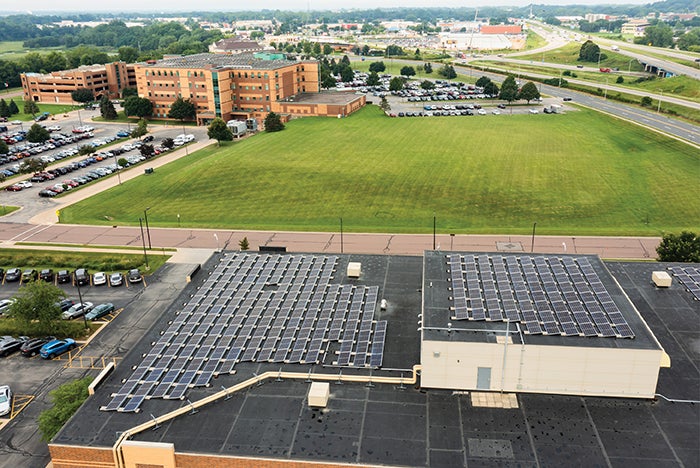Health system, utility partner on microgrid project

More than 900 photovoltaic panels on the Gundersen Onalaska Clinic produce more than 300,000 kilowatts of electricity.
Courtesy of Gundersen Health System
Gundersen Health System and Bellin Health, both based in Wisconsin, are partnering to soon become one entity, Emplify Health. One of its first ventures together is a new project at the Gundersen Lutheran Onalaska (Wis.) Clinic that will make it a 100% resilient and renewable energy campus. The campus broke ground on a new microgrid comprised of a battery energy storage system, including solar panels and energy generated through a biogas partnership with the La Crosse County (Wis.) Landfill.
“Previously our landfill biogas generator was an export device,” says Tim Wilson, facility operations manager at Gundersen Health. “We generated electricity, we exported it and were paid for it. We’re essentially flipping that around so that we can power the campus.”
The project took off with funding through the Inflation Reduction Act and support from local utility Xcel Energy’s Empower Resiliency program. Xcel works with customers to design, build and maintain technology-agnostic energy solutions on customer premises. Xcel owns the systems, and customers pay for the equipment through their utility bill.
“Xcel is going to operate it for the first 10 years, and then we have the opportunity to operate it ourselves or hire another operator,” Wilson says.
Work is underway, with installation expected to be completed in 2026.
“A lot of the work now is invisible, like a lot of sustainability projects tend to be,” explains Ariel Brophy, project manager for Gundersen Health System’s Envision sustainability program. “It is mostly underground, connecting our landfill generator and solar so that we can control them properly.”




